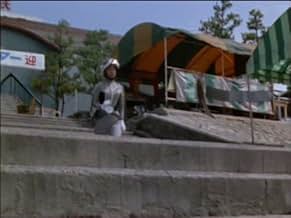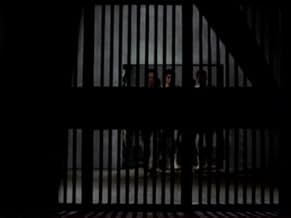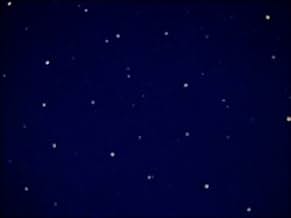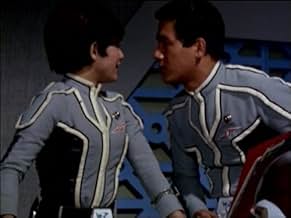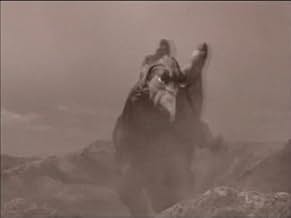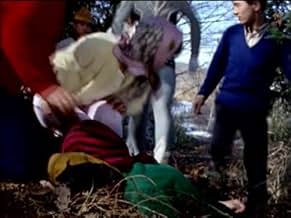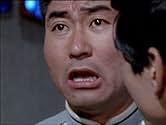An alien superhero from M-78 protects Earth from extraterrestrial threats in this popular classic follow-up to the original "Ultraman" TV series.An alien superhero from M-78 protects Earth from extraterrestrial threats in this popular classic follow-up to the original "Ultraman" TV series.An alien superhero from M-78 protects Earth from extraterrestrial threats in this popular classic follow-up to the original "Ultraman" TV series.
Browse episodes
Featured reviews
I loved this TV show "Ultra Seven"(1967-68) when i was a kid, I saw it before knowing Ultraman was the original, but for me Ultra Seven is much better, It was cool, he transformed by wearing a pair of "sunglasses", and he didn't have the time limit that Ultraman had. Unlike Ultraman, Ultraseven can make himself, giant, normal, or miniature in size. And he had a very cool weapon, a very sharp "boomerang-blade" on top of his helmet.
And the stories were very nice written for a show mostly done for kids (writters: do not under estimate kids) and "Gozilla" fans. Some of the shows were very impressive for me,I had to turned off the TV when he made himself miniature and entered in the nose and lungs of a girl to save her life, well I was a kid. The show was filled with good drama, acting, lot of monsters, space gadgets, and cool monster-kicking action. I think they made a remake of Ultra Seven in the late 70's but I'm no sure, I just say it because the second time I saw the show,the stories where the same but it looked different than I remembered (maybe it just the memory of a 6 year old to blame), it does not matter any way.
I think Ultra Seven and Ultraman inspired the Power-Ranger series (not my favorite show), but if you like them do not miss the originals, they are fun to watch.
And the stories were very nice written for a show mostly done for kids (writters: do not under estimate kids) and "Gozilla" fans. Some of the shows were very impressive for me,I had to turned off the TV when he made himself miniature and entered in the nose and lungs of a girl to save her life, well I was a kid. The show was filled with good drama, acting, lot of monsters, space gadgets, and cool monster-kicking action. I think they made a remake of Ultra Seven in the late 70's but I'm no sure, I just say it because the second time I saw the show,the stories where the same but it looked different than I remembered (maybe it just the memory of a 6 year old to blame), it does not matter any way.
I think Ultra Seven and Ultraman inspired the Power-Ranger series (not my favorite show), but if you like them do not miss the originals, they are fun to watch.
As the third entry to this huge franchise, it turns out to be much better than I expected. While it's still has the same formula as before, "huge bad guys versus good guys" or "monster of the week" formula to be exact, Ultraseven tries to be different from it's previous entries as the tone for this one are much darker and the mood also seems to became more serious than before. The gore also appears pretty frequently too.
Although the beginning of the show seems to be really weak and lazy in it's first 3 episodes, it starts to became progressively better as soon as the show goes on. Each of the episodes has it's unique plot, another reason why I like early Showa Ultraman era so much. Some of the episodes has different filmmaking style that feels like you're watching a different show (ex. Episode: The Untargeted Town). Anyways, I like that Tsuburaya spices something new and unique, and it works magically.
Talking about the conclusion to the show. The finale is simply monumental and incredible, not only because it is better than that 1965 Ultraman ending, it's because you can feel what happen to the characters and Ultraseven. You can feel the threat given by the monsters. The score in the finale, even though the composer did not made it due to ran out of time, adds that feeling that you'll never get it again in any of Ultraman shows.
Overall, this is one of the best Showa Ultraman shows out there. Go watch it, it will subvert your expectations.
Although the beginning of the show seems to be really weak and lazy in it's first 3 episodes, it starts to became progressively better as soon as the show goes on. Each of the episodes has it's unique plot, another reason why I like early Showa Ultraman era so much. Some of the episodes has different filmmaking style that feels like you're watching a different show (ex. Episode: The Untargeted Town). Anyways, I like that Tsuburaya spices something new and unique, and it works magically.
Talking about the conclusion to the show. The finale is simply monumental and incredible, not only because it is better than that 1965 Ultraman ending, it's because you can feel what happen to the characters and Ultraseven. You can feel the threat given by the monsters. The score in the finale, even though the composer did not made it due to ran out of time, adds that feeling that you'll never get it again in any of Ultraman shows.
Overall, this is one of the best Showa Ultraman shows out there. Go watch it, it will subvert your expectations.
I watched it when I was a kid many years ago. The best show of the ultra family.It was a disappointed when TNT aired a chopped version of the series. The effects were great for that time.It was so good that the studios made some special movies until a few years ago. If you watch Ultra Seven or any of the Japanese fiction series (like Johnny Sooko and his giant robot,Ultraman, The MJ, etc.), you will see how the Power Rangers is a cheap copy of the pioneer work of the Japanese studios. I wish the series will came available on DVD for the USA market, uncut with all the episodes (one episode was deleted of the official line up). I know there are a legion of fans of this genre.
Ultra 7 was very much ahead of its time. A few years back it was playing on TBS at 3am on Saturdays. It was very cool watching it as an adult and still enjoying it. I am not sure if it was brought back in the late 70's but that is when I was watching it as a kid. I lived in Hawaii for a few years growing up and was fortunate enough to watch other Japanese "superhero" television...Getaroba G, the Five Rangers (pre power ranger), raydene, robot man etc.. All were great in my opinion. Would love to see some of them today. I remember back and think that the subject matter was a little more adult than some of the knock offs today are??? Anyways if you get the chance to see any of these enjoy them.
The third in the "Ultra" series by Toho, and Tsuburaya Production, this series is often acknowledged as the best of the Ultraman series even to this day.
Dan Moroboshi (Koji Moritsugu) was an observer from M78 nebula visiting the earth. He was masquerading as a vagrant but due to his support of the Ultra squad in the first episode, he gets recruited into it. The members of the Ultra squad seeing Ultra Seven battle the alien, names him "Ultra Seven" as the seventh member of the Ultra squad.
The popularity of this series increased as years went by, and both the Seven, and its two stars Koji Moritsugu, and Yuriko Hishimi have gained even bigger star status than when the series aired for the first time in 1967. Eight subsequent specials/series have been made some commemorating 30, 35th, and 40th anniversary of the original series. It is now known that Dan and Anne married in their later life.
Koji Moritsugu reprised his role as Dan Moroboshi in Ultraman Leo (1974), this time as the captain of the Ultra squad.
This series has a different take compared to other sagas of the "Ultra" series, namely that Ultra Seven only battles aliens, and no monsters that originates from earth. This set the stage for in depth introspection of our own culture in the way Star Trek did with its encounter with other space fairing race. It also introduced innovative weapons that Ultra Seven wields such as the capsule monsters, eye slugger (boomerang type weapon), and Emerium ray (emitted from Seven's forehead). Although not mentioned, the amount of time Seven can stay in his form on earth seems to be 3 minutes which is consistent with that of Ultraman. The tone was darker, and acting was more serious than that of the previous Ultra series. This was in part due to the request of the program's sole sponsor Takeda Chemical's request to draw more adults to the program.
Even for the famous Ultra series, few has seen increased popularity over the years like this one which attests to its originality, and far reaching concept of its producers. Ultra Seven is still popular character and sees frequent revisits to earth as a member of the Ultra Brothers that now has over 16 members, and still counting.
Dan Moroboshi (Koji Moritsugu) was an observer from M78 nebula visiting the earth. He was masquerading as a vagrant but due to his support of the Ultra squad in the first episode, he gets recruited into it. The members of the Ultra squad seeing Ultra Seven battle the alien, names him "Ultra Seven" as the seventh member of the Ultra squad.
The popularity of this series increased as years went by, and both the Seven, and its two stars Koji Moritsugu, and Yuriko Hishimi have gained even bigger star status than when the series aired for the first time in 1967. Eight subsequent specials/series have been made some commemorating 30, 35th, and 40th anniversary of the original series. It is now known that Dan and Anne married in their later life.
Koji Moritsugu reprised his role as Dan Moroboshi in Ultraman Leo (1974), this time as the captain of the Ultra squad.
This series has a different take compared to other sagas of the "Ultra" series, namely that Ultra Seven only battles aliens, and no monsters that originates from earth. This set the stage for in depth introspection of our own culture in the way Star Trek did with its encounter with other space fairing race. It also introduced innovative weapons that Ultra Seven wields such as the capsule monsters, eye slugger (boomerang type weapon), and Emerium ray (emitted from Seven's forehead). Although not mentioned, the amount of time Seven can stay in his form on earth seems to be 3 minutes which is consistent with that of Ultraman. The tone was darker, and acting was more serious than that of the previous Ultra series. This was in part due to the request of the program's sole sponsor Takeda Chemical's request to draw more adults to the program.
Even for the famous Ultra series, few has seen increased popularity over the years like this one which attests to its originality, and far reaching concept of its producers. Ultra Seven is still popular character and sees frequent revisits to earth as a member of the Ultra Brothers that now has over 16 members, and still counting.
Did you know
- TriviaConsidered by Japanese fans to be not only the most popular entry of the Ultra Series, but also one of Japan's greatest sci-fi/superhero TV shows. Due to his huge popularity, the character of Ultra Seven (as well as his alter-ego, Dan Moroboshi, played by Kôji Moritsugu) has appeared in more sequels and spin-offs than any other character in the Ultra Series.
- Crazy creditsThis was the first English-dubbed Japanese TV series in Hawaii (in 1975). Produced by Tsuburaya's Hawaii branch, it was dubbed by the Commercial Recording Company in Honolulu, and the voice talent consisted of several students from the Speech Department of the University of Hawaii.
- Alternate versionsIn current Japanese verisons, Episode 12 "Yûsei Yori Ai wo Komete" ("From Another Planet with Love") has been banned since 1970, because the episode offended irradiated survivors of Hiroshima and Nagasaki. The episode featured the Spehl Aliens, whose planet was destroyed by radiation, so they come to Earth to extract fresh blood from humans to restore their bodies. The episode was directed by Akio Jissoji, written by Mamoru Sasaki and guest starred Hiroko Sakurai (who played Yuriko Edogawa in "Ultra Q" and Akiko Fuji in "Ultraman"). However, the Hawaiian English version included the episode, as did TPS/Cinar's Canadian English dub, under the title "Crystalized Corpuscles."
- ConnectionsFeatured in Space Ghost Coast to Coast: $20.01 (1996)
- SoundtracksUrutora Sebun no Uta
("The Song of Ultra Seven")
Main Title Theme
Music Composed and Arranged by Toru Fuyuki
Lyrics by Kyôichi Azuma (pseudonym for Hajime Tsuburaya)
Sung by The Echoes & the Misuzu Childrens' Choir
- How many seasons does Ultraseven have?Powered by Alexa
Details
Contribute to this page
Suggest an edit or add missing content


